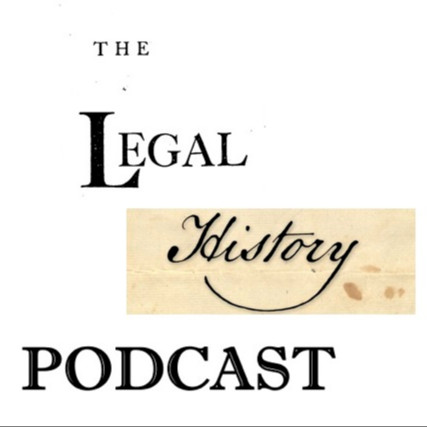Episodes

Monday Jun 13, 2022
EPISODE 29: Jonathan Gienapp
Monday Jun 13, 2022
Monday Jun 13, 2022
Jonathan Gienapp is an assistant professor in Stanford’s Department of History. He is a scholar of Revolutionary and early republican America specializing in the period’s constitutionalism, political culture, legal history, and intellectual history. He is also interested in the method and practice of the history of ideas. His first book, The Second Creation: Fixing the American Constitution in the Founding Era (Harvard University Press, Belknap, 2018), rethinks the conventional story of American constitutional creation by exploring how and why founding-era Americans’ understanding of their Constitution transformed in the earliest years of the document’s existence. It investigates how early political debates over the Constitution’s meaning helped alter how Americans imagined the Constitution and its possibilities, showing how these changes created a distinct kind of constitutional culture, the consequences of which endure to this day. It won the 2017 Thomas J. Wilson Memorial Prize from Harvard University Press and the 2019 Best Book in American Political Thought Award from the American Political Science Association and was a finalist for the 2019 Frederick Jackson Turner Award from the Organization of American Historians. He has written extensively on the relationship between history and constitutional originalism, including in two essays that appeared on Process: A Blog for American History, published by the Organization of American Historians. He is currently completing a book (under contract with Yale University Press) that presents a comprehensive historical critique of originalism a preview of which can be found in an article recently published in Law and History Review, "Written Constitutionalism, Past and Present."

Tuesday Dec 28, 2021
EPISODE 28: Warren Milteer, Jr.
Tuesday Dec 28, 2021
Tuesday Dec 28, 2021
In this episode, Siobhan talks with Warren Eugene Milteer, Jr. about his book North Carolina’s Free People of Color, 1715-1885 (LSU Press, 2020). Milteer is an assistant professor of history at the University of North Carolina at Greensboro. His other publications include Beyond Slavery’s Shadow: Free People of Color in the South (UNC Press, 2021), the independently published Hertford County, North Carolina’s Free People of Color and Their Descendants (2016), as well as articles in the Journal of Social History and the North Carolina Historical Review. Milteer was the recipient of the Historical Society of North Carolina’s R. D. W. Connor Award in 2014 and 2016 for the best journal article in the North Carolina Historical Review.
Milteer’s innovative study moves beyond depictions of the American South as a region controlled by a strict racial hierarchy. He contends that although North Carolinians frequently sorted themselves into races imbued with legal and social entitlements—with whites placing themselves above persons of color—those efforts regularly clashed with their concurrent recognition of class, gender, kinship, and occupational distinctions. Whites often determined the position of free nonwhites by designating them as either valuable or expendable members of society. In early North Carolina, free people of color of certain statuses enjoyed access to institutions unavailable even to some whites. Prior to 1835, for instance, some free men of color possessed the right to vote while the law disenfranchised all women, white and nonwhite included.
North Carolina’s Free People of Color, 1715–1885 demonstrates that conceptions of race were complex and fluid, defying easy characterization. Despite the reductive labels often assigned to them by whites, free people of color in the state emerged from an array of backgrounds, lived widely varied lives, and created distinct cultures—all of which, Milteer suggests, allowed them to adjust to and counter ever-evolving forms of racial discrimination.

Wednesday Nov 10, 2021
EPISODE 27: Samantha Barbas
Wednesday Nov 10, 2021
Wednesday Nov 10, 2021
In this episode, Siobhan talks with Samantha Barbas about her book The Rise and Fall of Morris Ernst: Free Speech Renegade (UCP, 2021). Barbas is Professor of Law at the University at Buffalo School of Law. She researches and teaches in the areas of legal history, First Amendment law, and mass communications law. Her work focuses on the intersection of law, culture, media and technology in United States history. Her recent research has explored the history of censorship, privacy and defamation.
In the 1930s and ’40s, Morris Ernst was one of America’s best-known liberal lawyers. The ACLU’s general counsel for decades, Ernst was renowned for his audacious fights against artistic censorship. He successfully defended Ulysses against obscenity charges, litigated groundbreaking reproductive rights cases, and supported the widespread expansion of protections for sexual expression, union organizing, and public speech. Yet Ernst was also a man of stark contradictions, waging a personal battle against Communism, defending an autocrat, and aligning himself with J. Edgar Hoover’s inflammatory crusades.
Arriving at a moment when issues of privacy, artistic freedom, and personal expression are freshly relevant, The Rise and Fall of Morris Ernst, Free Speech Renegade brings this singularly complex figure into a timely new light. As Samantha Barbas’s eloquent and compelling biography makes ironically clear, Ernst both transformed free speech in America and inflicted damage to the cause of civil liberties. Drawing on Ernst’s voluminous cache of publications and papers, Barbas follows the life of this singular idealist from his pugnacious early career to his legal triumphs of the 1930s and ’40s and his later idiosyncratic zealotry. As she shows, today’s challenges to free speech and the exercise of political power make Morris Ernst’s battles as pertinent as ever

Wednesday Jul 28, 2021
EPISODE 26: Samuel Fury Childs Daly
Wednesday Jul 28, 2021
Wednesday Jul 28, 2021
In this episode, Siobhan talks with Samuel Fury Childs Daly about his J. Willard Hurst Prize winning book A History of the Republic of Biafra: Law, Crime, and the Nigerian Civil War (Cambridge University Press, 2020). Daly is Assistant Professor of African and African American Studies and History at Duke University. He is a historian of twentieth century Africa whose research combines legal, military, and social history to describe Africa's history since independence.
The Republic of Biafra lasted for less than three years, but the war over its secession would contort Nigeria for decades to come. Samuel Fury Childs Daly examines the history of the Nigerian Civil War and its aftermath from an uncommon vantage point – the courtroom. Wartime Biafra was glutted with firearms, wracked by famine, and administered by a government that buckled under the weight of the conflict. In these dangerous conditions, many people survived by engaging in fraud, extortion, and armed violence. When the fighting ended in 1970, these survival tactics endured, even though Biafra itself disappeared from the map. Based on research using an original archive of legal records and oral histories, Daly catalogues how people navigated conditions of extreme hardship on the war front, and shows how the conditions of the Nigerian Civil War paved the way for the country's long experience of crime that was to follow.

Monday May 24, 2021
EPISODE 25: Nurfadzilah Yahaya
Monday May 24, 2021
Monday May 24, 2021
In this episode, Siobhan talks with Nurfadzilah Yahaya about her book Fluid Jurisdictions: Colonial Law and Arabs in Southeast Asia (Cornell University Press, 2020). She is Assistant Professor of History at the National University of Singapore where she specializes in the history of the Indian Ocean, Southeast Asia, Islamic law, and mobilities. Her second book project will be on the history of land reclamation in the British Empire.
This wide-ranging, geographically ambitious book tells the story of the Arab diaspora within the context of British and Dutch colonialism, unpacking the community's ambiguous embrace of European colonial authority in Southeast Asia. In Fluid Jurisdictions, Nurfadzilah Yahaya looks at colonial legal infrastructure and discusses how it impacted, and was impacted by, Islam and ethnicity. But more important, she follows the actors who used this framework to advance their particular interests.

Friday Feb 05, 2021
EPISODE 24: Joseph David
Friday Feb 05, 2021
Friday Feb 05, 2021
In this episode, Siobhan talks with Joseph E. David about his book Kinship, Law and Politics: An Anatomy of Belonging (CUP, 2020). David is a Visiting Professor (Adjunct) of Law at Yale Law School and a Visiting Professor at the Program in Judaic Studies at Yale University. He is an Associate Professor of Law at Sapir Academic College in Israel. His research focuses on Law and Religion, Legal History, Comparative Law, and Jurisprudence.
Why are we so concerned with belonging? In what ways does our belonging constitute our identity? Is belonging a universal concept or a culturally dependent value? How does belonging situate and motivate us? Joseph E. David grapples with these questions through a genealogical analysis of ideas and concepts of belonging. His book transports readers to crucial historical moments in which perceptions of belonging have been formed, transformed, or dismantled. The cases presented here focus on the pivotal role played by belonging in kinship, law, and political order, stretching across cultural and religious contexts from eleventh-century Mediterranean religious legal debates to twentieth-century statist liberalism in Western societies. With his thorough inquiry into diverse discourses of belonging, David pushes past the politics of belonging and forces us to acknowledge just how wide-ranging and fluid notions of belonging can be.

Tuesday Sep 29, 2020
EPISODE 23: Charles Zelden
Tuesday Sep 29, 2020
Tuesday Sep 29, 2020
In this episode, Siobhan talks with Charles L. Zelden about the new expanded edition of his book, “Bush v. Gore: Exposing the Growing Crisis in American Democracy” (University Press of Kansas, 2020). Zelden is a professor in the Department of History and Political Science at Nova Southeastern University's Halmos College of Arts and Sciences, where he teaches courses in history, government and legal studies.
In this third expanded edition Zelden offers a powerful history of voting rights and elections in America since 2000. Bush v. Gore exposes the growing crisis by detailing the numerous ways in which the unlearned and wrongly learned “lessons of 2000” have impacted American election law through the growth of voter suppression via legislation and administrative rulings, and, provides a clear warning of how unchecked partisanship arising out of Bush v. Gore threatens to undermine American democracy in general and the 2020 election in particular.

Wednesday Aug 12, 2020
EPISODE 22: Philip Thai
Wednesday Aug 12, 2020
Wednesday Aug 12, 2020
In this episode, Siobhan talks with Philip Thai about his book, “The War on Smuggling: Law, Illicit Markets, and State Power on the China Coast” (Columbia University Press, 2018). Thai is Assistant Professor of History at Northeastern University. He is a historian of Modern China with research and teaching interests that include legal history, economic history, and diplomatic history.
Smuggling along the Chinese coast has been a thorn in the side of many regimes. From opium and weapons concealed aboard foreign steamships in the Qing dynasty to nylon stockings and wristwatches trafficked in the People’s Republic, contests between state and smuggler have exerted a surprising but crucial influence on the political economy of modern China. Seeking to consolidate domestic authority and confront foreign challenges, states introduced tighter regulations, higher taxes, and harsher enforcement. These interventions sparked widespread defiance, triggering further coercive measures. Smuggling simultaneously threatened the state’s power while inviting repression that strengthened its authority.
Philip Thai chronicles the vicissitudes of smuggling in modern China—its practice, suppression, and significance—to demonstrate the intimate link between illicit coastal trade and the amplification of state power. China’s War on Smuggling shows that the fight against smuggling was not a simple law enforcement problem but rather an impetus to centralize authority and expand economic controls. The smuggling epidemic gave Chinese states pretext to define legal and illegal behavior, and the resulting constraints on consumption and movement remade everyday life for individuals, merchants, and communities. Drawing from varied sources such as legal cases, customs records, and popular press reports and including diverse perspectives from political leaders, frontline enforcers, organized traffickers, and petty runners, Thai uncovers how different regimes policed maritime trade and the unintended consequences their campaigns unleashed. China’s War on Smuggling traces how defiance and repression redefined state power, offering new insights into modern Chinese social, legal, and economic history.

Wednesday Jul 29, 2020
EPISODE 21: Ariela Gross and Alejandro de la Fuente
Wednesday Jul 29, 2020
Wednesday Jul 29, 2020
In this episode, Siobhan talks with Alejandro de la Fuente and Ariela Gross about their book, “Becoming Free, Becoming Black: Race, Freedom, and Law in Cuba, Virginia, and Louisiana” (Cambridge University Press, 2020).
How did Africans become 'blacks' in the Americas? Becoming Free, Becoming Black tells the story of enslaved and free people of color who used the law to claim freedom and citizenship for themselves and their loved ones. Their communities challenged slaveholders' efforts to make blackness synonymous with slavery. Looking closely at three slave societies - Cuba, Virginia, and Louisiana - Alejandro de la Fuente and Ariela J. Gross demonstrate that the law of freedom - not slavery - established the meaning of blackness in law. Contests over freedom determined whether and how it was possible to move from slave to free status, and whether claims to citizenship would be tied to racial identity. Laws regulating the lives and institutions of free people of color created the boundaries between black and white, the rights reserved to white people, and the degradations imposed only on black people.
Alejandro de la Fuente is Robert Wood Bliss Professor of Latin American History and Economics and is Professor of African and African American Studies and of History at Harvard University. He is a historian of Latin America and the Caribbean who specializes in the study of comparative slavery and race relations.
Ariela Gross is John B. and Alice R. Sharp Professor of Law and History at the University of Southern California Gould School of Law where she teaches Contracts, History of American Law, and Race and Gender in the Law. Her research and writing focuses on race and slavery in the United States.

Friday Jul 17, 2020
EPISODE 20: Paul Finkelman
Friday Jul 17, 2020
Friday Jul 17, 2020
In this episode, Lesa Redmond talks with Paul Finkelman about his book "Defending Slavery: Proslavery Thought in the Old South (Second Edition)" (Bedford/St. Martin's, 2020). Finkelman is an American Legal Historian and President of Gratz College.
Guest host Lesa Redmond is a first year student in the Department of History at Duke University. Her research focuses on colleges and universities and their connections to slavery.

